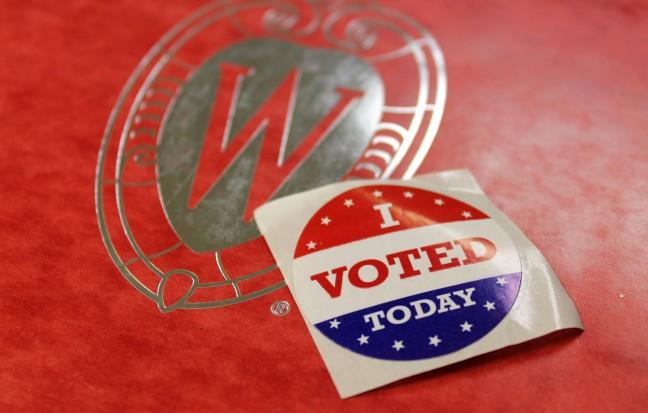From Sept. 25 to Sept. 28, the City of Madison commemorated National Voter Registration Day by holding registration drives throughout the week at various locations. However, registration does not end there.
Reid Magney, a Public Information Officer at the Wisconsin Elections Commission, said there is a multitude of ways to register in Wisconsin. One heralded by Magney is online registration, available in Wisconsin for the first time this year.
Jacqueline Beaulieu of the City of Madison City Clerk’s Office said the office made efforts to partner with the University of Wisconsin to make sure students registered to vote.
“There were several voter registration drives on campus on National Voter Registration Day (9/25),” Beaulieu said in an email. “We partnered with ASM and the League of Women Voters to register voters at the bus pass distribution.”
In partnership with The Associated Students of Madison, UW provides students the option to register to vote when they pick up their free Metro Transit passes on campus.
Beaulieu also noted the impact of the Big Ten Voting Challenge on student registration. All schools in the Big Ten Conference compete for highest student voter turnout and most improved voter turnout, she explained.
Magney said one must possess a Wisconsin driver’s license or state identification card to register online. After an eligible voter fills out the appropriate forms on the state website, the information on their license or identification card is cross-referenced with DMV databases, Magney said.
However, when asked about those who do not have those state-centric identifications — out of state students at UW being a part of that group — Magney said there were still options.
“You can do a modified version of that exact same online process,” he said. “You still go to the site, you still fill out all the information, but instead of everything going through right away, it gives you a PDF that you have to print.”
Study shows surge in Wisconsin youth voter registration since Parkland shooting
Magney suggested two ways to complete registration after filling out the form: either mailing it in to the City Clerk’s Office or bringing the form and proof of residence to an early voting site.
Magney said the form will be approved by an election worker on site, given the registrant has the proper identification, and the form is filled out correctly.
“Almost every day could be voter registration day because of the way our law is,” Magney said, citing Wisconsin’s lax registration laws. “In a lot of other states, you need to be registered a month in advance of an election. Here, you can register on election day.”
Magney said increasing accessibility to voter registration is a priority of the state, and on Sept. 25, the Wisconsin Elections Commission even voted to allow credit card statements as a valid proof of residence. In the past, this was not the case.
UW looks to encourage civic duty through Big Ten voting challenge
Dr. Barry Burden, Political Science professor, Director of the Elections Research Center and the Lyons Family Chair in Electoral Politics at UW, noted these efforts as well, and said the bus pass distribution rendered approximately two thousand registered student voters.
Speaking to overall characteristics of Madison’s voting population, Burden said Madison was “maybe one of the most democratic provinces in the country.” He added that Madison was younger, more upwardly mobile and had higher levels of education compared to the rest of the state.
Magney said Dane County has 322,084 registered voters, while Madison has 157,575.
Burden said data on certain voting wards, or electoral districts, have allowed political scientists to see overall voting trends among groups of UW students. Some of these wards contain on-campus housing, while others contain off-campus housing mainly populated by students.
According to this data, Burden noted that this past presidential election had most wards in heavy support of Hillary Clinton. He added that the UW student body has begun to have a very strong Democratic leaning, a new phenomenon within the last ten years.
“The electorate this fall, both in Madison, but also more generally, will likely shift Democratic compared to 2014 or 2010 midterms,” Burden said.
Burden said before this trend, the UW campus had periods of neutrality where students were not generally in favor of one party or another, and even had times where, on average, students favored the Republican party more.
Burden said a common trend in midterm elections often occurs, where the party of the president in office tends to fair poorly among voters.
Despite apparent declining faith in voter system, vote remains integral, panel says
This year, Burden said there are four issues many voters will primarily be concerned with: education, transportation funding, jobs and the economy and healthcare.
In regards to education, Burden said GOP Governor Scott Walker and Democratic candidate Tony Evers have very different approaches to the education system, with Walker making cuts overall, and Evers stating an interest in reinvesting in education.
These differences, Burden said, have the potential to render a very divided electorate.
Burden also noted that the condition of roads, and reinvesting in transportation, is a hot button issue among Wisconsin voters. Healthcare has also become a majorly politicized issue for voters as the Trump administration dismantled parts of the Affordable Care Act, Burden said. Many voters are concerned as to what will now be covered by federal and state government, he said.
Magney said that, for him, there is one main priority as election day approaches.
“We [the Wisconsin Elections Commission] don’t care if voters are young or old or middle aged or Democratic or Republican,” Magney said. “We just hope everyone votes.”

















